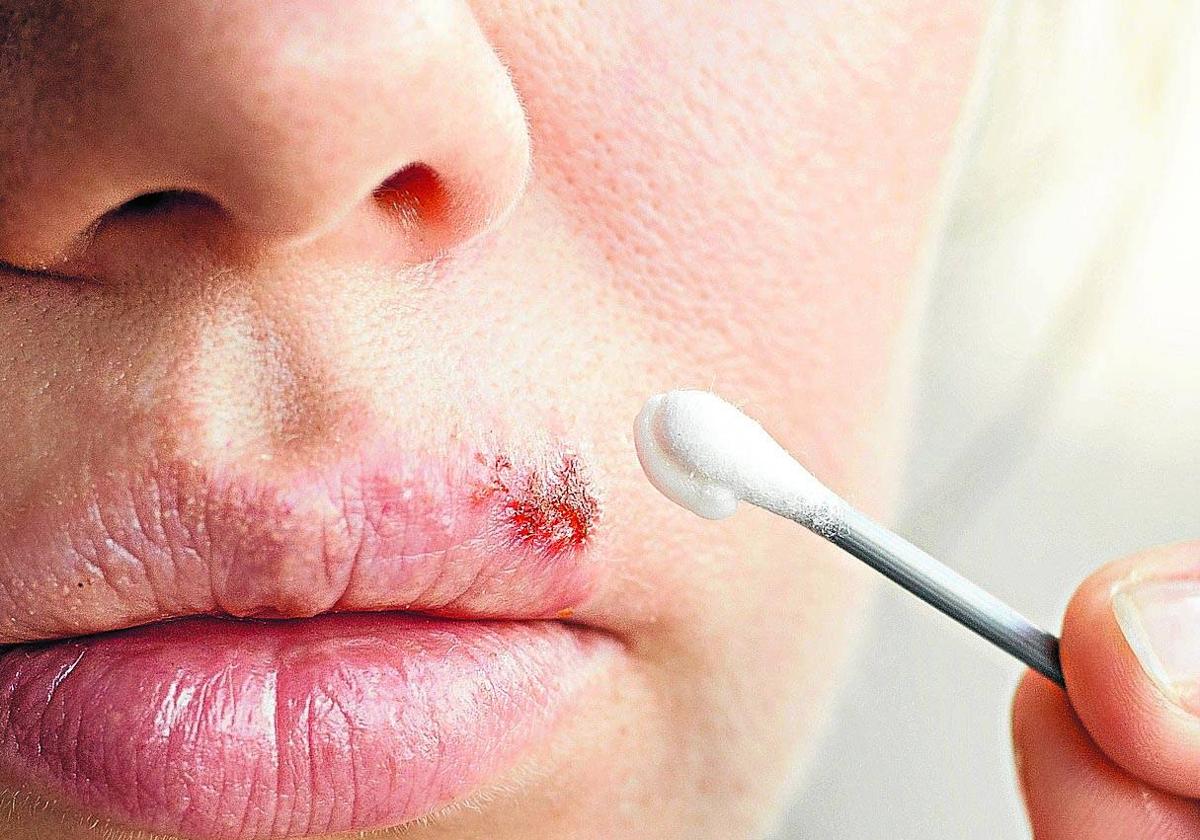Why do we get cold sores and how can we treat them?
Stress, exposure to the sun, hormonal changes... these can all trigger a flare-up
Carmen Barreiro
Madrid
Friday, 15 December 2023, 16:45
First you notice a slight tingling on the lips, then you feel a thudding pain in your mouth and a few hours later... wham! You look in the mirror and there it is. Some call it a fever blister, others a cold sore, or just a bleb... what we call it is unimportant. It is herpes simplex, a very common viral infection affecting more than half the world's population. It usually occurs on the lips or around the mouth, but it can also appear in the genital area. The symptoms are most annoying: blisters, scabs, itching, pain, a burning sensation, even fever and feeling unwell in general.
"The herpes simplex virus (HSV) is very contagious and is transmitted through saliva, mucous membranes (such as nasal fluids) and by direct contact with the blistered area, so we must be on our guard and take great care not to spread the infection even further," warns Dr Alexandre Docampo, member of the Spanish Academy of Dermatology and Venereology (AEDV) and dermatologist at the Gavin Dermatologists clinic in Vigo. There is no cure for the blistering, but "they usually disappear in two or three weeks without leaving a scar". Here are some of the key points to aid our understanding as to why we get these disagreeable sores at the most inopportune times.
Causes and symptoms
The majority of people infected with HSV are completely asymptomatic. Still, there are many others who, at the first time they come into contact with this virus, they not only get a general fever, but their body reacts more intensely with temperature spikes, headaches, swollen lymph nodes, generally feeling poorly...
"In the case of children under five years of age, sores can also appear inside the mouth, which are often confused with thrush," adds the doctor.
What happens after that first contact – and which also explains why the blisters almost always appear in the exact same place – is that the virus remains lodged in the nerve endings of the infected area "in a kind of dormant state until it finds a favourable situation to reawaken", explains Dr Pilar Gil, dermatologist at the teaching hospital, Clínica Universidad de Navarra (CUN).
HOW TO PREVENT GETTING COLD SORES
-
Avoid kissing
-
Although it may be obvious, avoid kissing other people when you have a herpes flare-up. The virus spreads more easily when the blisters leak fluid. In the case of genital sores, avoid having sex or make sure to use a condom.
-
Use sun protection
-
One of the causes that trigger cold sores is high temperatures. Use a lipstick with sunscreen.
-
Don't share personal items
-
Such as letting other people use your cutlery, towels, lip salve ...
-
Follow strict hand hygiene
-
It is essential to keep our hands clean, especially when in contact with infants. Wash hands frequently to avoid infection.
The experts agree on the typical causes that trigger the reappearance of HSV: "stress, any injuries to the affected area, fatigue, prolonged exposure to sun or wind and any changes in either our hormones (especially when menstruating) or our immune system". What is still unknown is why herpes reoccurs in some people and not in others, especially in cases where it recurs more frequently. Some studies link the severity and intensity of the symptoms when first infected with the frequency with which blistering reappears.
Blisters
In the case of genital herpes, the dermatologists explain further: "the most common afflictions are in the form of balanitis (inflammation of the head of the penis (glans)), vaginitis or vulvitis (inflammation of the vagina or vulva), which are very painful and cause issues when passing urine".
Although the most common forms of herpes are labial and genital, there is another relatively common HSV among people who practice contact sports, especially wrestlers and rugby players. It is known as 'herpes gladiatorum' (aka 'mat herpes'). "Flare-ups usually occur on the chest, face, arms and hands, areas where transmission of the infection is helped by contact with the affected areas as they practice these sports."
Dr Docampo explains that the sores "usually get better of their own accord within four weeks maximum without serious complications".
Treatment
As for topical antiviral creams, the go-to fix for the blisters, "there is no scientific evidence that they speed up the healing process. They can somewhat mitigate the symptoms (itching, burning...), but little else. Something similar happens with sticking plasters: they do not treat the sores, they simply help them not to spread so easily.The important thing in these cases is to keep the affected area clean to prevent a super infection [second infection with a microbial agent such as a bacterium or virus]. In general, topical antiseptics or antibiotics such as chlorhexidine or povidone-iodine (Betadine) can be used".
Complications
For some people this virus can cause health issues elsewhere on the body, such as on fingertips (common in children who suck their thumb) or the eyes. If infections keep reappearing, they can cause scarring and lesions that could seriously affect eyesight. As the dermatologists sum up: "Patients with atopic dermatitis are at increased risk of cold sores spreading to other parts of the body".


Comentar es una ventaja exclusiva para registrados
¿Ya eres registrado?
Inicia sesiónNecesitas ser suscriptor para poder votar.